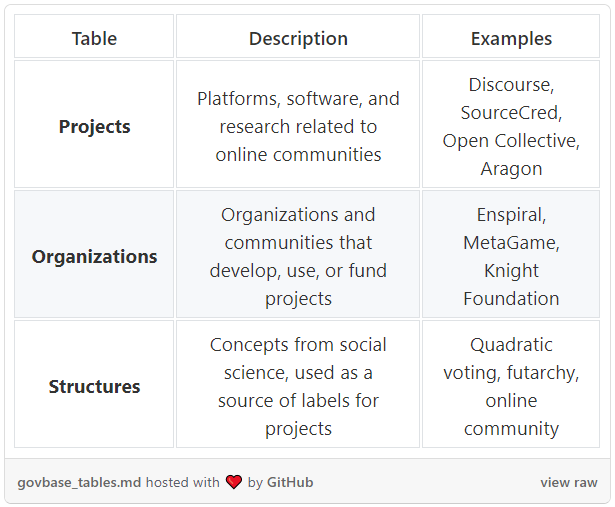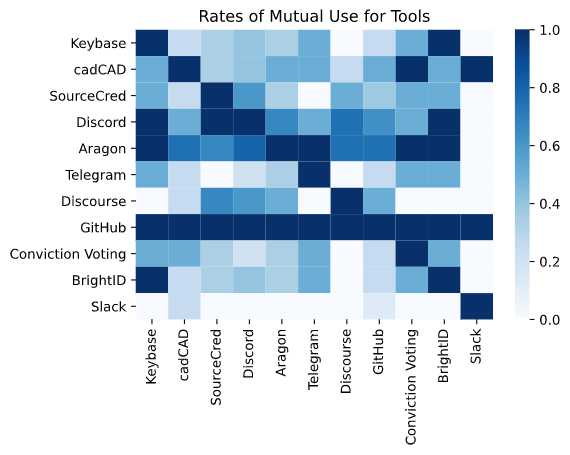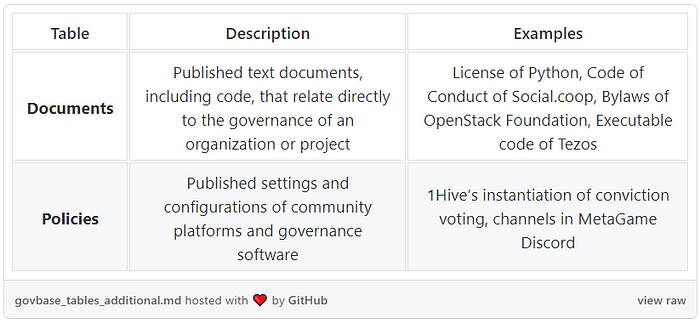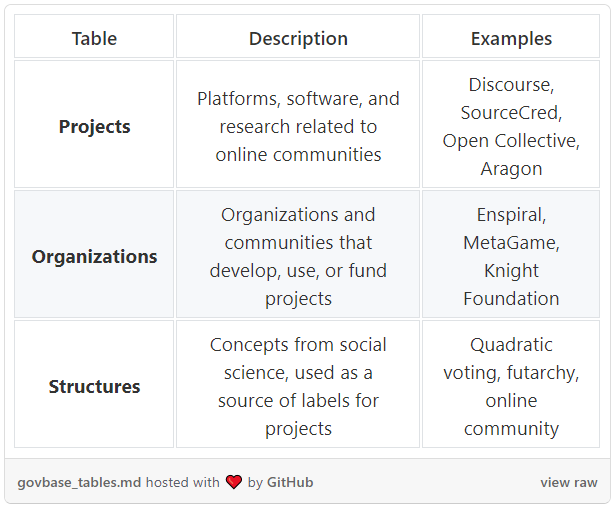An open database of projects and tools in online governance
By Joshua Tan and Michael Zargham
How do we run online communities? The growing field of online governance answers this question using a range of tools: voting algorithms, social media platforms, community management software, (crypto)economic designs, and even real-world laws. But just what tools are out there, who’s building them, and who’s using them? In this article, we introduce Govbase, an open, crowdsourced database of projects and tools in online governance, and discuss how we’re using it to foster more interoperability between the many tools and platforms available to online communities.
Who is Govbase for?
Govbase is a database of projects and tools in online governance. It is intended for developers and researchers.
If you want to pick the best out-of-the-box platform for your social club or gaming guild, Govbase will not help you do that. Govbase can help if any of the following apply to you:
- you’re developing governance software and want to figure out what’s already out there
- you’re building (and financing) a community platform and want to see how others did it
- you’re thinking of contributing time or money to a project, and want to compare projects
- you’re new to online governance and want to make sense of what’s going on
But don’t take our word for it: go click around for yourself, or visit the code repository. We’re building it because we want to understand the opportunities for collaboration and interoperability in the small but growing ecosystem of activists, technologists, and scientists who work in online governance
Govbase is organized into three main tables:
1. Projects
2. Organizations
3. Structures
Projects
Projects includes a wide range of software and research projects involved in online governance, from forum software like Discourse to computational tools like SourceCred and cadCAD to blockchain projects like DAOstack to community platforms like Open Collective. The goal of the Projects table is to include all the tools and projects relevant to online governance.

Organizations
Organizations is a non-comprehensive list of offline companies, nonprofits, and funders like Enspiral and the Free Software Foundation as well as online communities like 1Hive, r/teenagers, and Nurfed. The goal of the Organizations table is not to list all the organizations working in online governance, much less all the online communities on the Internet, but to provide context for the Projects table.
Structures
The Structures table is a grab-bag of concepts and governance forms (a.k.a. institutional patterns) from social science, loosely organized by a subset-superset relation (“Is subset of”), a part-whole relation (“Is component of”), and by social ontology (“Belongs to ontology”). We have big plans for it, but for now, it’s mainly a source of labels for Projects.

We’re also hoping to build two more tables — Documents and Policies — that we’ll discuss at the end of the article.
Govbase Mapping
At its core, Govbase is organized as a mapping from a list of software projects to a list of governance structures — so if you want to create a DAO, you can query Govbase with ‘DAO’ and it will return a list of DAO frameworks [1].
But it is also a visual map of software projects in online governance, one that represents a project’s nearest neighbors by function (Aragon, DAOstack, and Moloch are all DAO frameworks), by usage (it turns out a lot of communities use Discord and Discourse together), by funding (Gitcoin has helped fund a number of governance projects) and by current dependencies / interop (ActivityPub is a “dependency” of many decentralized social platforms).
These maps are important tools for understanding the fast-changing, polycentric collaborations between the many stakeholders in online governance; they can help us navigate and form new collaborations in response to new needs or shared goals.

A Random Walk through the Aragon Network
Let’s zoom in on one part of the Govbase map and see it in practice. Aragon is a DAO framework, meaning it’s a tool for implementing DAOs. It’s a software project operating on Ethereum and built in Solidity. It’s a platform, by which we mean it’s a piece of software that hosts online communities.
Aragon the platform is different from the Aragon (user) community, which is again different from the Aragon Foundation. The Aragon community, the Aragon Association, and the Aragon Network DAO are all organizations, but they’re related to Aragon the platform in different ways. The Aragon Association owns Aragon the platform in that it is the legal steward and principal governor of the code, while the Aragon community contributes to Aragon the platform through buying tokens, through voting, and through software commits. The Aragon Network DAO is a formal medium through which the Aragon community votes on proposals.
Finally, Aragon the platform hosts a number of other online communities, not all of which are DAOs. Here is a (non-comprehensive) list of the organizations that use Aragon, along with some of the other tools that they use.
Delving into the Project's Data
When we first started building Govbase, we thought that different projects could naturally be thought of as functions that take an organization and give it a particular governance structure, kind of like a charter establishes a group of people as an LLC, a B corp, or a nonprofit. But the data didn’t fit this hypothesis. Most projects and platforms in online governance don’t correspond to or implement a specific governance structure. There’s no single tool or library that implements a democracy, though there are a bunch of different implementations of common voting structures.
We also learned that communities tend to operate across many tools and platforms. For example, a single online community may operate a Discord instance, a Discourse forum, a Telegram chat, and a social media presence across multiple platforms. These tools often show up together (see the figure below).

Another thing that we realized was that many governance projects — especially the open-source ones — emerged from organic collaborations between several individuals and organizations rather than from a single developer or company. These collaborations can be incredibly fluid and often don’t have well-defined boundaries in terms of a website, a repo, or a legal “owner”. They’re invisible to people outside the field, so the only way to capture them is to crowdsource the data. But these collaborations are incredibly valuable, since informal collaborations often evolve into full-fledged projects.
Looking Towards Interoperability
There’s a lot of passion in the field of online governance, but there’s also a lot of misdirected effort. Grant money for development comes in bursts, so projects tend to have short life-cycles. The field is very wide and not particularly well-organized, so there’s a lot of overlap between projects. And non-commercial tools rarely get the kind of polish more commercial projects have, leading to endemic adoption issues for the tools that do get developed. More interoperability and more re-use is not the only answer to these problems, but it is one answer.

However, there is no one-size-fits-all approach to achieve interoperability. The best strategy depends on the motives of industry players and the nature of the technology. For the field of online governance, we believe the best strategy is to focus on a common publishing standard for community constitutions. Communities already have ways of communicating the governance of that community, whether in pinned posts, comments by authoritative users, or a formal constitution. What if, upon installing and setting up a given governance tool, there was an easy way of publishing that set-up and its intended usage to a common, readable standard? Besides being useful for communities, it would help clarify how different governance tools interact and interoperate — tools that publish to the same sections of a computational constitution would enjoy a minimal level of interoperability, if only at the level of text (which is still where most governance systems are currently specified). Further, that computational constitution could be spliced with the governance documents that communities already produce, doing for communities what Sphinx currently does for code. Imagine a world in which every online community displayed a standardized constitution that articulated the rights and responsibilities of its users, much as every open-source software project displays a standardized software license. We think that’d be pretty cool!
That’s why, in the next few months, we’ll be working on extending Govbase with two new tables: Documents and Policies. Documents covers the written aspects of governance, from licenses to codes of conduct to existing constitutions. Policies covers the settings and configurations of community platforms and governance software. Govbase will be able to store and display both, serving as a kind of registry for computational constitutions much as the Constitute Project serves as a registry for national constitutions.

For Community, by Community
Govbase is designed to be a shared database. We built it to foster collaborations and interoperability, but we sincerely believe that the most accurate and authoritative database is one that can serve a bunch of different needs. So if the database is not useful to you right now but it could be with some new columns or a new view, please let us know!
And lastly: we’ve filled out the database starting with the tools and communities we know. But the Internet is a big, big place. Please help us by contributing your own projects (especially ones that are still works-in-progress!), whether by using the form or by emailing us for editor access.
Some links for easy access:
- The database, on Airtable
- The project homepage, on GitHub
- The documentation
- Forms: add a new project, add a new organization, add a new document
Acknowledgements. Govbase is inspired by and draws on data from several other mapping initiatives, including the Civic Tech Field Guide, Democratic Mediums, Democracy Foundation, CredCatalog, DAOs in the Wild, DAObase, and Participedia. We would also like to thank Jeff Emmett, Nathan Schneider, Nastia Sadovnik, Amy Zhang, and Burrrata for their helpful comments and suggestions.
Endnotes
- To be clear, we are not saying that tools are panaceas; policymaking within the tools matters too. As we’ll get into later, that’s why we’re hoping to build a Policies table that captures more detailed information about tool usage.
About BlockScience
BlockScience® is a complex systems engineering, R&D, and analytics firm. Our goal is to combine academic-grade research with advanced mathematical and computational engineering to design safe and resilient socio-technical systems. We provide engineering, design, and analytics services to a wide range of clients, including for-profit, non-profit, academic, and government organizations, and contribute to open-source research and software development.


